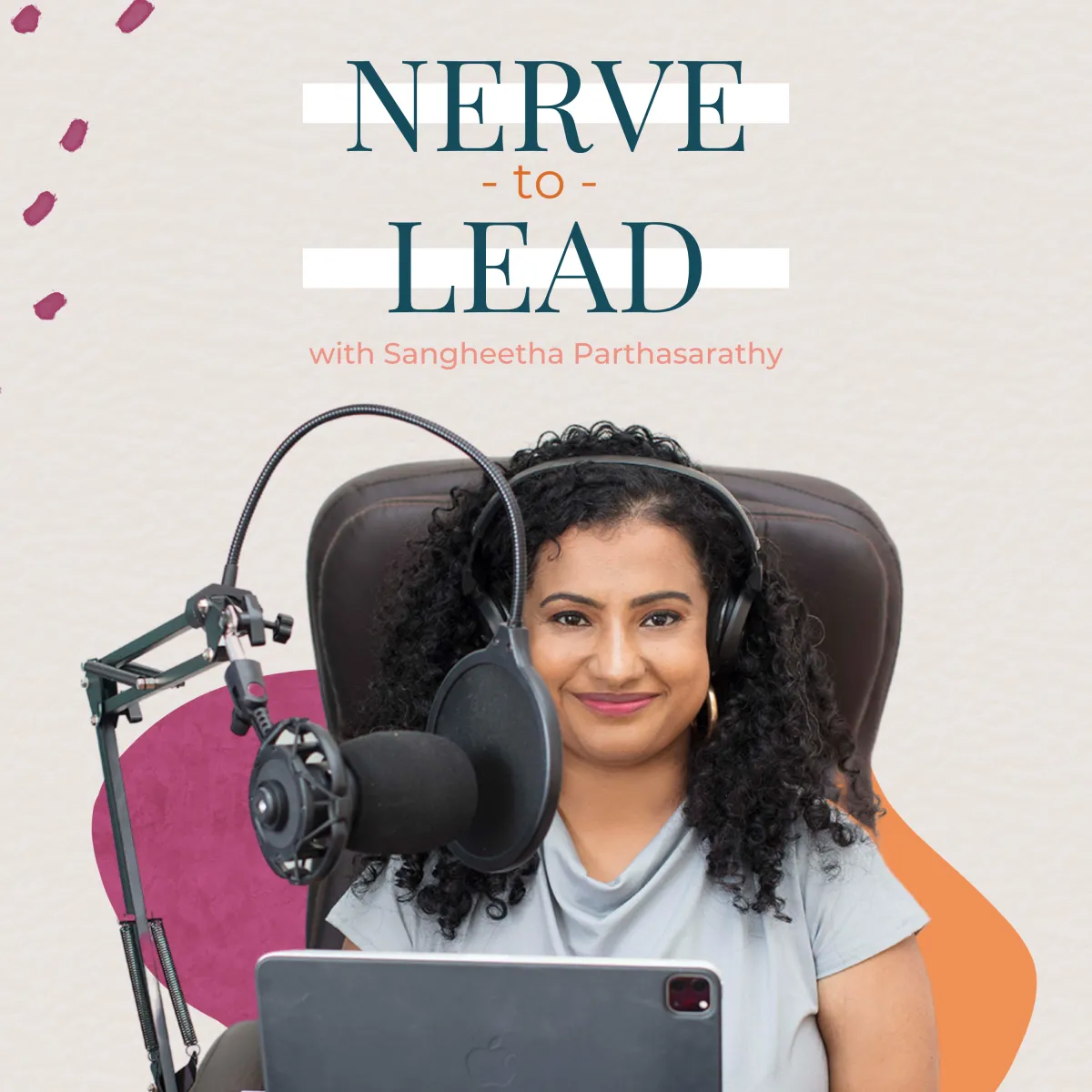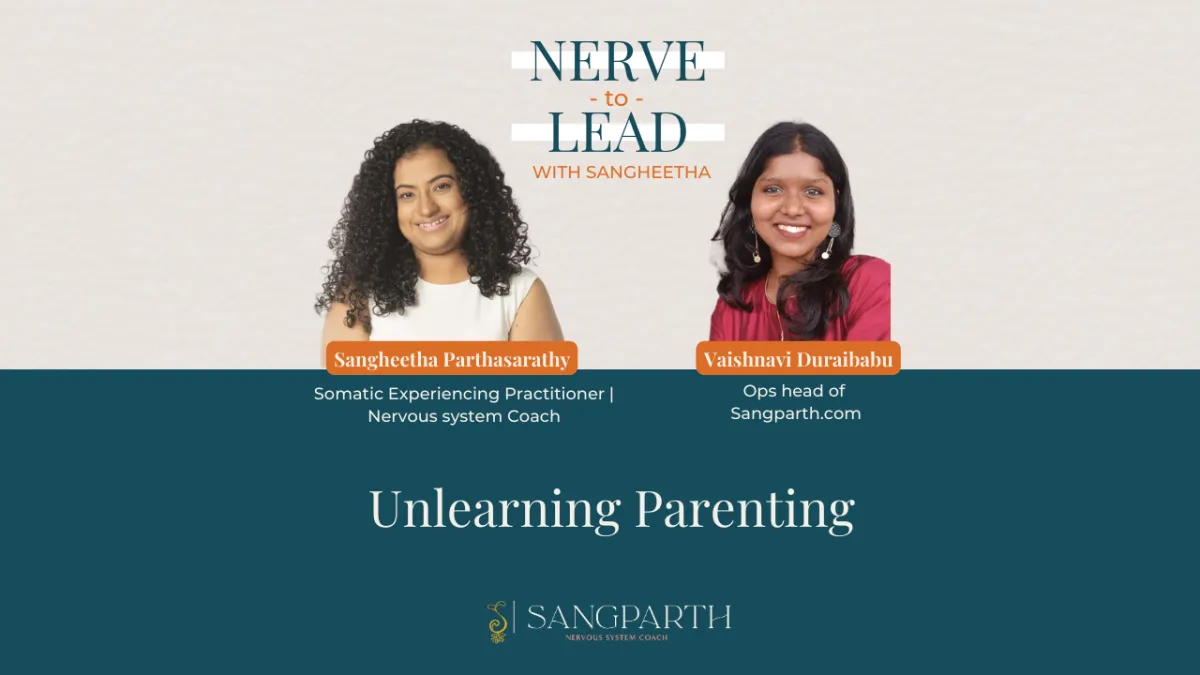The Nerve To Lead Podcast
with Sangheetha Parthasarathy
On The Nerve to Lead podcast, your host, Sangheetha Parthasarathy encourages CEOs, Entrepreneurs, deep thinkers, the round-pegs-in-square-holes, change-makers and visionaries to share their stories of power, pleasure and passion.
We cover everything from nervous system regulation, high achievement, trauma healing, parenting, partnership and attachment, intimacy and more. You will also get to learn the stories and knowledge from our expert guests and thought leaders.

Apply to be a guest on
Nerve to Lead Podcast
Welcome to 'Nerve to Lead' podcast. Apply here to be a guest on the podcast with Sangheetha Parthasarathy.
Invite Sangheetha as a
guest to your podcast
Invite Sangheetha, a Nervous System Coach, Speaker and Consultant to be a guest on your podcast.

Unlearning Parenting
LISTEN TO THE EPISODE
EPISODE TRANSCRIPTS
INTRODUCTION
Welcome to the Nerve to Lead podcast. Here we explore power, pleasure, leadership, identity, belonging, parenting, and couplehood, and explore stories of navigating through life, finding both authenticity and attachment through the common lens of the nervous system. I am your host, Sangheetha Parthasarathy and I'm so glad you're here.
INTRODUCING VAISH
Today we're gonna talk about high achievers becoming and being parents. Joining me today is Vaishnavi. Welcome, Vaish. Vaishnavi runs the operations of sangparth.com. She is the backbone for everything we do over here. And we've been working together for more than a year, and Vaish is also very deeply involved in the nervous system regulation work itself. And personally for me, it's a lot easier to be in conversation with somebody, that way it feels organic and it flows. So, welcome Vaish Hello.
Thank you, it's lovely to be here.
HOME OFFICE & CONNECTED PARENTING
So today I wanted to share something I observed. So I work with Sangheetha here in her home office. So I come in every day so I get a front seat to her entire interpersonal life as her being a parent, her being a partner, and all of that. So one of the lovely thing I observed one day was, so she has two children, Laya and Swara so they come to the office room right after they finish their school, and we'll be working around three in the afternoon. So one day, the younger one asked, she came upstairs and she was very frustrated about something. And she was basically throwing a tantrum. I think she's six-year-old. Yeah. I think she was, I don't know if she was hungry or angry, and they have the term called hangry meaning, hunger and anger. And I'm always amused by the way they're able to articulate their emotions. Um, so it's very amusing for me to stay around that.
So one day she was going through that emotion and I think she had her homework to read something. And for some reason, she doesn't like reading and that activates some emotion in her body. And she is communicating that and throwing a tantrum. And then I was very amused by the way Sangheetha handled, you handled it. You were asking her, in what state are you in? Are you in I can state or are you in I cannot state? And she's continuing her tantrum and you have a very regulated presence. You don't have a very high pitch, loud noise. You're not screaming at her. You're very regulated and you're telling her, I feel like you are in 'I cannot' state. And we cannot do this reading now. So you take your time and you come back to me when you're in 'I Can' state, but I'm here to support you.
And that was something that I've never seen, I've not seen an adult modeling that. So I would just like to talk about that today. How are you able to do that? How are you able to have that kind, yet a very affirming voice to your child? And I know you, you're very regulated even when a child is throwing tantrum and you are responding in a very respectful manner, yet you hold your stand. How do you do that?
WHAT DOES IT TAKE FOR A PARENT TO STAY REGULATED THROUGH A CHILD'S DYSREGULATION ?
Oh, I think you caught us on a good day. That's one. So, it's been an extraordinary journey to get here. And that doesn't mean that I respond like that all the time. I'm human and I do go through many moments of dysregulation with them. And parenting has a really amazing way of triggering so many things that we didn't know existed in us, you know, when we become parents, I think that moment probably summarizes everything that I have invested on in the last 10 years. Starting with the time before I became a parent. This whole journey about investing in understanding attachment and neuroscience and becoming a practitioner and all of that, I think has been worth it to have that one less yelling episode a day. It's more than that. I think the amount of time that I'm able to stay in my body and stay regulated with them has increased. It's not zero. I do go through, it's a function of what I have in terms of resources and capacity, and yeah.
CONTEXT SWITCHING WHILE BEING A PARENT-ENTREPRENEUR
How do you switch that? You are here being a very good mentor and a boss. We are in a workspace. How do you do that switch? How are you suddenly a parent and still you're kind there too. How do you do that switch? How do you manage this?
Oh, yeah. It's been so much. I mean you know this, you've probably seen this but I say this a lot. So once I think I was doing a workshop on early attachment breastfeeding and gentle parenting this was during Covid and it was for like an international conference. And I was there on Zoom in this room. And I was talking, this was early and this was big. I'm coming from a corporate environment where it is unprofessional to have children or anything come in and interrupt your client time, especially when you're talking, right? So I need the door closed. I need to be on time and I need to do sound check and mic check. And know, this whole context switching is very, very anti capitalist patriarchy way of working, right? you think about our current ways in which the work ethic that we come with installed as default is this very industrial British and what's called Protestant work ethic, right? Where work is sacred and, work is different from life and then life cannot be a part of work and all of that. So I'm carrying all of these stories in my body.
CREATING SPACES WHERE WORK AND PARENTING CAN FLOW
Therefore, when I decided to create a home office on this floor, I was driven by two desires, one to be a more present attuned parent and be able to maximize both aspects. And also what I was not prepared for is how much the work flows in and out of life. And grappling with my own stories about that. So anyway, going back to that conference. I had had backups back backups for childcare for that hour. I had like three backups and all of them weren't available, you know, just didn't come through in that moment. And so my younger one comes running in and she wants to be cuddled, and my older one wants to say hi to everybody on the zoom call. And I was in that conference being the speaker about attachment and gentle parenting, and my body was so triggered and I felt ashamed.
That's how much this conditioning is deep, you know, this corporate conditioning in me. And then, I just sort of laughed and said, oh, this is the irony. And I told them about the plans and how they fell through, and then we continued that conversation. So this is a long way of saying that at every moment I think I am unlearning a lot of what I was raised with around professionalism and attunement and all of that, so that's one. And I think it's getting easier with time.
PARENTING PERFECTIONISM
The big piece is dealing with the shame. I think parenting has a way, if you grew up with a very critical parent or both set of critical parents, this inner critical, not good enough will kill you, it is there relentlessly. That's what pushes you to have all these achievements, but that literally screws with the way you parent or the way you show up as a spouse. Because, when it comes to attachment, it's safety. but when you're carrying all of this, what's lying behind perfectionism is actually shame, so you are pre-programmed to seek perfection over progress so it means that I might have been this regulated mother eight out of 10 tantrums in a day, but the one, one tantrum that I was dysregulated is the one that I'm going to psychoanalyze the heck out of. And also get so frustrated that you don't even wanna invest in this healing process, right? So that's the pattern and I think the more regulated my nervous system is, the more everybody around me is neurocepting that. So to answer your question, it's not always like that, but it's practice.
SELF-CARE MYTHS, AND WHY WE NEED TO RENAME IT "DEALING WITH SHAME "
And people say self care. I don't, I mean what does that mean? There's no self care if you can't deal with the shame and the not good enoughness that the high achievers have so much of, it's crippling. So self-care looks very different for different people. If you come with that setting of this inner critical voice that's constantly claiming to push you and you're dealing with that, then that's gonna shame you for everything, including you didn't do self care properly.
Oh yeah, that was a good one. Yeah. Yeah. So I think the biggest piece is to understand and deal with the shame and get help for myself.
THERAPISTS/COACHES INVESTING IN PERSONAL GROWTH
I'm a therapist myself and I'm a very strong proponent of therapists need other therapists to hold and work with, right? So to summarize, I think it's been a very long journey.
SANGHEETHA'S PERSONAL PARENTING TRIGGERS
For me, my triggers are when my daughters display traits that I'm yet to reckon with in myself. For example, attention and focus is one, being messy. And the things about myself that when I'm dysregulated I'm all of those things. And I think those are some very shamed parts of myself.
WHAT ARE THE "BIG 3" OF PARENTING TRIGGERS ?
And then when you see this, and this is common in all of the clients that I see, usual triggers around this when parents get dysregulated in parenting, it's the big three, right? So sleep and food, that's the big two. Because both of those are attachment very early, both sleep and food is very early attachment. And so these two tend to be huge triggers. And then the third one is academic slash extracurricular, how they're the performance piece, yeah. Then there are the others, strictness and all. But you know what, when you come from this, both people being quote unquote busy professionals, high achievers whatever tag you call it when you come into parenting, I think there's either this, I want to control this.
CONTROL VS ATTUNEMENT
The ideal is co-regulation and attunement. So when you're able to have that with your children, you don't need books or rules or anything like that. But in the absence of you understanding your body and your triggers, and in the absence, you having the empathy and the ability to attune to the child, you rely on external markers, charts, schedules, rigidity, control. And it's not an either or. You can have both and you can have the structure and you can have atunement. I'm not saying it's an either or.
But sometimes when this is not the way it is supposed to be, we might over rely on on that, you know, external markers. And because your early attachment was conditional on you performing, you might also find yourself turning parenting into a teachable moment, oh yeah, all parenting moments are teachable. So there is a model of the story, and there is person or behaviors to be changed, blamed, critiqued, right? yeah.
CONNECTION OVER CORRECTION
And the very famous, your thing that I got it from you, connection before correction.
And now a small break to talk about more resources. We have created an autonomic safety assessment for parents, which helps baseline our co-regulation capacity, which is available for free to download and use.
https://www.sangparth.com/parenting-checklist-form
It is available as a link on the episode show notes. Now back to our conversation.
Yeah that's the thing. So when we struggle to connect really body to body, connect with nervous system to nervous system, then we default to correction, everything is a should.
WHATS HIDING BEHIND YOUR "SHOULD"S ? HEALTHY VS TOXIC SHAME
And every time you hear a should, chances are there is a very critical voice lurking behind it. And underneath that there is shame. So you wanna think about shame, you need a percentage of shame to show up in the world, right? Which is called healthy shame. However, when you grow up in environments that prioritize achievement and performance, then there is usually a lot of very toxic shame. Therefore, love, belonging is conditional. That's big T trauma for anybody who's listening.
GRATITUDE TO PARENTS AND INVESTING IN INTERGENERATIONAL TRAUMA HEALING ARE NOT MUTUALLY EXCLUSIVE
And it's absolutely okay for you to be extremely thankful and grateful for your caregivers because that's what made you who you are in the world, big and external markers of achievement. And also come into this huge realization usually in the context of either dating or finding intimate partners or staying in a marriage or if that's not the trigger, parenting will do it for you. When you see terror in your child's eyes after you have just gone at it, that'll do it. That will bring you to the work. So talking about high achievers, they become parents. I think turning parenting into a spectator sport is a big one, right? We know that now the externally achievable markers continuing, you know that, and it's not that, that in itself is a problem.
SOUTH ASIAN PARENTING - ITS NOT THE FOCUS ON ACHIEVEMENT, THAT’S NOT THE PROBLEM
What I mean by I really want you to understand it, it's not the focus on achievement. It's the focus of achievement and love being conditional. This sense of I love you and you belong to me, and I love you, and I cherish you no matter what Sometimes is conditional or contingent upon achievement. Now that's the toxic piece. So not necessarily wanting the child to achieve it's this piece, the traumatic piece. Anyway so turning parenting into a spectator sport, turning everything into a teachable moment, which means it's very hard for you to spend spontaneous time outside of structured activities with a child. And you feel like I can connect with you when we're parallel playing, you're doing a puzzle and I'm doing it with you. I'm teaching you a new skill, is the only way I can connect with you. It's a one way power. I'm in control and I'm teaching you things.
WHAT IS PLAY FROM A NERVOUS SYSTEM LENS ?
Therefore, it can come in the way of spontaneity and play, because we didn't have very early experiences of safe play, which is a blended state of ventral vagal safety and connection and sympathetic activation, where we experience, safe bickering, safe rough and tumble play. All of these are absolutely essential for early nervous system development. And so all of these spontaneity, creativity, being silly, having pillow fights all of those need to be planned Oh yeah. Even play needs to be planned. If any of these traits resonate with you, then there's a lot that one can bring to supplement your current way of parenting.
BEYOND BINARIES - HOW DO WE KEEP WHATS WORKING AND BUILD ON IT ?
Like I said, no, it's not that, the opposite of that is permissive parenting and do anything. No, that's not what we're saying exactly. So kids do need direction and structure and for somebody to believe that they are destined for bigger and greater things, and for us to see what they're interested in and supplement them in that way. But if you come from this kinda background, that's easy for you. And the work is to actually kinda slow down and add this connection, spontaneity, and unconditional piece. Therefore, you can hold both of those together.
A FUN GAME YOU CAN PLAY WITH YOUR KIDS
Yeah, that was lovely. So there are two perspectives in this, right? I'm not a parent yet, so I listened to this as how I should have been parented or what sort of a parent I want to be in the future. And so yeah, it's an early childhood thing to listen. It's very nice to even to hear you say, I love you and you belong here, and all of that. So one perspective is that, and another perspective is if anyone who's listening as a parent, that'll be a different perspective.
Oh, this is a fun game that we sometimes play in the night as we don't sleep. And they know what I mean when I say this. It's like, Hey, what will make me stop loving you? And then we come up with all these crazy scenarios, and then obviously the answer is no, I'm gonna love you no matter what. And just repeatedly saying that over and over again in a fun way, is that nothing's gonna make me stop loving you, and I'm here for you and it's hard and I'm right here with you. The other thing that you may have seen through a tantrum is not that we need to be saints, we do lose it.
HOW CAN I BE KIND TO MY OWN HUMANNESS DURING A CHILD'S TANTRUM ?
So you probably heard me say this, and when the tantrum goes on for a while, and I feel I'm reaching the edge of my regulatory capacities, I will also just name it accurately. So I will say, 'Swara, I can help Swara, mummy is here', and I find myself going to 'I can't help Swara mummy' in a little bit. That really helps with her it really, it's like, oh okay. and then she'd be like, Amma, can you help me calm down? I think she calls it calm down. I need help calming down. And that's ventral vagal right where she's neurocepting my presence and that help is available. That connection is available, right? Can you give me a hug? Can you help me calm down? That's ventral that's her ventral system is coming online. And then that's the window. And then we co-regulate, and then it calms down. And mostly, a lot of times she forgets what she was upset about. And so that's a way of saying you don't actually have to have any answers or problem solve the tantrum. You don't have to find out whether she's hungry or angry or as much as, okay, this is a dysregulated child who needs connection.
I'll tell you this 60 to 70% of parenting through tantrum child dysregulation don't really have to involve lessons learned, teachable moment, correction. Because yes, correcting repeated behaviors are important, but you'll be amazed at what you can do when you connect with them. Because they know at this point, like a six year old absolutely knows, and you've seen this, right? Like sometimes when we are doing this. So she's kicking me. Sometimes I'll draw attention to that, but many times after I connect with her, she'll be like, mummy, I'm sorry I kicked you. I didn't mean to, I didn't know what I was doing. And she really doesn't know what she's doing. Cause her whole body felt under threat. And not to condone that behavior, I will say that was not okay, what you did. It's important to say that, but not in a, you're a bad girl. Yeah. It's saying that was not okay. Yeah. And then over time, the work is for them to catch the dysregulation before it gets to that point and seek this co regulation, yeah.
CLOSING AND END CREDITS
That was lovely. Thank you, Sangheetha.
Thank you for joining me today on Nerve to Lead Podcast. The music you hear in this podcast was created by Sound Creed. You can find their link in the description. Thank you to Vaishnavi and Pavithra in team Sangparth for producing and editing this podcast. Did this episode resonate with you? If it did, please share it with your friends, family, coworkers, or clients. We would also love to hear from you. Drop us a note on www.sangparth.com
Thanks to Sound Creed for the music, you can visit them here https://www.youtube.com/@SoundCreedLLP
Curious about the work? Visit www.sangparth.com and book a free 15 minute call https://www.sangparth.com/15min-call
What we offer
Our Areas Of Focus

Career, Entrepreneurship& Leadership

Sex, Relationships
& Parenthood

Eating, Movement &
Body Image

